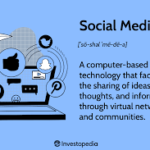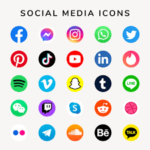B2B (business-to-business) and B2C (business-to-consumer) marketing are two distinct approaches in the realm of social media communication. This article highlights the key differences between B2B and B2C marketing strategies on social media platforms.

- Target Audience:
The primary distinction between B2B and B2C marketing lies in the target audience. B2B marketing targets businesses, organizations, or professionals, while B2C marketing targets individual consumers or end-users. Understanding the specific audience helps shape the marketing strategies and messaging on social media. - Relationship Building:
B2B marketing focuses on building long-term professional relationships with clients or business partners. Relationship-building efforts are based on trust, expertise, and mutually beneficial collaborations. B2C marketing, on the other hand, emphasizes building a connection and emotional resonance with individual consumers to drive immediate purchases. - Content Strategy:
B2B marketing on social media often involves sharing informative, industry-specific content that demonstrates expertise, addresses pain points, and offers solutions. Content formats may include whitepapers, case studies, webinars, or thought leadership articles. B2C marketing content is more consumer-centric, focusing on entertainment, inspiration, and persuasive messaging to drive impulse purchases. - Sales Cycle:
The sales cycle in B2B marketing is typically longer and involves multiple decision-makers. Social media platforms serve as a means to nurture leads, educate potential clients, and establish trust over an extended period. In B2C marketing, the sales cycle tends to be shorter, with consumers making quicker purchasing decisions influenced by social media content and promotions. - Personalization and Targeting:
B2B marketing emphasizes personalization based on specific business needs, industry challenges, and professional interests. Social media communication aims to tailor content and messages to address the unique requirements of target businesses. B2C marketing prioritizes broader audience targeting based on demographic factors, interests, and consumer behavior. - Influencer Marketing:
While both B2B and B2C marketing can leverage influencer partnerships, the approach differs. In B2B marketing, influencers are typically industry experts or thought leaders who can provide insights, expert opinions, or testimonials to drive credibility and trust. B2C marketing often involves partnering with influencers who have a large following and can promote products or services to a broad consumer audience. - Lead Generation:
B2B marketing on social media often focuses on lead generation and nurturing. Strategies may include offering gated content, hosting webinars, or directing potential clients to landing pages for more information. B2C marketing aims to generate immediate purchases or drive traffic to e-commerce platforms through engaging content, promotions, and limited-time offers.
B2B and B2C marketing strategies on social media platforms differ significantly due to the contrasting target audiences, relationship-building approaches, content strategies, sales cycles, personalization, influencer marketing, and lead generation tactics. Understanding these distinctions is crucial for businesses to tailor their social media marketing efforts effectively, engage with the right audience, and achieve their desired outcomes, whether it’s building professional relationships or driving consumer purchases.











































